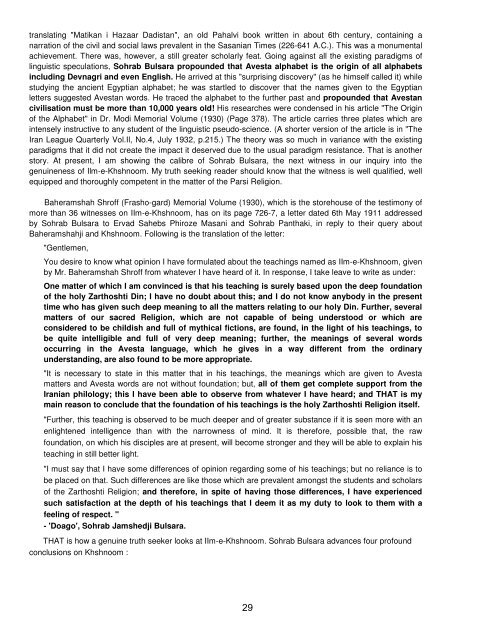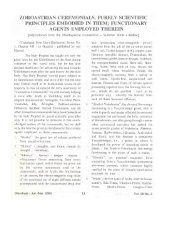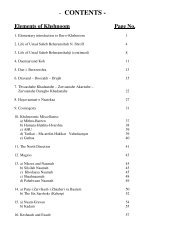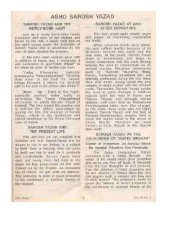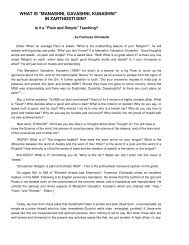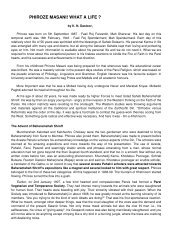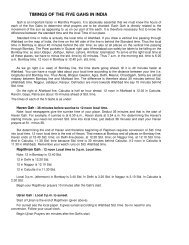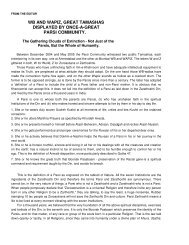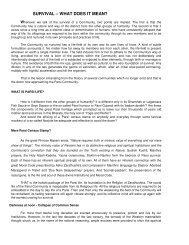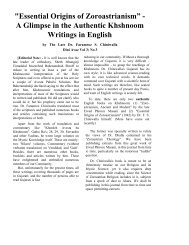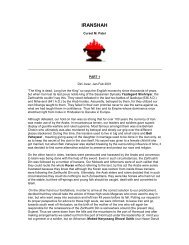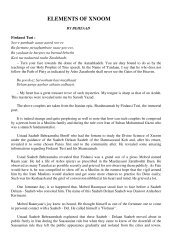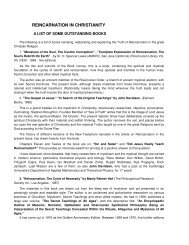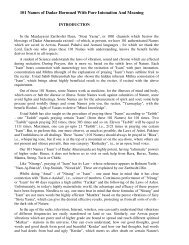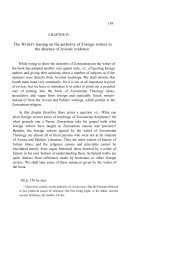Ilm-e-Khshnoom - Traditional Zoroastrianism: Tenets of the Religion
Ilm-e-Khshnoom - Traditional Zoroastrianism: Tenets of the Religion
Ilm-e-Khshnoom - Traditional Zoroastrianism: Tenets of the Religion
You also want an ePaper? Increase the reach of your titles
YUMPU automatically turns print PDFs into web optimized ePapers that Google loves.
translating "Matikan i Hazaar Dadistan", an old Pahalvi book written in about 6th century, containing a<br />
narration <strong>of</strong> <strong>the</strong> civil and social laws prevalent in <strong>the</strong> Sasanian Times (226-641 A.C.). This was a monumental<br />
achievement. There was, however, a still greater scholarly feat. Going against all <strong>the</strong> existing paradigms <strong>of</strong><br />
linguistic speculations, Sohrab Bulsara propounded that Avesta alphabet is <strong>the</strong> origin <strong>of</strong> all alphabets<br />
including Devnagri and even English. He arrived at this "surprising discovery" (as he himself called it) while<br />
studying <strong>the</strong> ancient Egyptian alphabet; he was startled to discover that <strong>the</strong> names given to <strong>the</strong> Egyptian<br />
letters suggested Avestan words. He traced <strong>the</strong> alphabet to <strong>the</strong> fur<strong>the</strong>r past and propounded that Avestan<br />
civilisation must be more than 10,000 years old! His researches were condensed in his article "The Origin<br />
<strong>of</strong> <strong>the</strong> Alphabet" in Dr. Modi Memorial Volume (1930) (Page 378). The article carries three plates which are<br />
intensely instructive to any student <strong>of</strong> <strong>the</strong> linguistic pseudo-science. (A shorter version <strong>of</strong> <strong>the</strong> article is in "The<br />
Iran League Quarterly Vol.Il, No.4, July 1932, p.215.) The <strong>the</strong>ory was so much in variance with <strong>the</strong> existing<br />
paradigms that it did not create <strong>the</strong> impact it deserved due to <strong>the</strong> usual paradigm resistance. That is ano<strong>the</strong>r<br />
story. At present, I am showing <strong>the</strong> calibre <strong>of</strong> Sohrab Bulsara, <strong>the</strong> next witness in our inquiry into <strong>the</strong><br />
genuineness <strong>of</strong> <strong>Ilm</strong>-e-<strong>Khshnoom</strong>. My truth seeking reader should know that <strong>the</strong> witness is well qualified, well<br />
equipped and thoroughly competent in <strong>the</strong> matter <strong>of</strong> <strong>the</strong> Parsi <strong>Religion</strong>.<br />
Baheramshah Shr<strong>of</strong>f (Frasho-gard) Memorial Volume (1930), which is <strong>the</strong> storehouse <strong>of</strong> <strong>the</strong> testimony <strong>of</strong><br />
more than 36 witnesses on IIm-e-<strong>Khshnoom</strong>, has on its page 726-7, a letter dated 6th May 1911 addressed<br />
by Sohrab Bulsara to Ervad Sahebs Phiroze Masani and Sohrab Panthaki, in reply to <strong>the</strong>ir query about<br />
Baheramshahji and <strong>Khshnoom</strong>. Following is <strong>the</strong> translation <strong>of</strong> <strong>the</strong> letter:<br />
"Gentlemen,<br />
You desire to know what opinion I have formulated about <strong>the</strong> teachings named as IIm-e-<strong>Khshnoom</strong>, given<br />
by Mr. Baheramshah Shr<strong>of</strong>f from whatever I have heard <strong>of</strong> it. In response, I take leave to write as under:<br />
One matter <strong>of</strong> which I am convinced is that his teaching is surely based upon <strong>the</strong> deep foundation<br />
<strong>of</strong> <strong>the</strong> holy Zarthoshti Din; I have no doubt about this; and I do not know anybody in <strong>the</strong> present<br />
time who has given such deep meaning to all <strong>the</strong> matters relating to our holy Din. Fur<strong>the</strong>r, several<br />
matters <strong>of</strong> our sacred <strong>Religion</strong>, which are not capable <strong>of</strong> being understood or which are<br />
considered to be childish and full <strong>of</strong> mythical fictions, are found, in <strong>the</strong> light <strong>of</strong> his teachings, to<br />
be quite intelligible and full <strong>of</strong> very deep meaning; fur<strong>the</strong>r, <strong>the</strong> meanings <strong>of</strong> several words<br />
occurring in <strong>the</strong> Avesta language, which he gives in a way different from <strong>the</strong> ordinary<br />
understanding, are also found to be more appropriate.<br />
"It is necessary to state in this matter that in his teachings, <strong>the</strong> meanings which are given to Avesta<br />
matters and Avesta words are not without foundation; but, all <strong>of</strong> <strong>the</strong>m get complete support from <strong>the</strong><br />
Iranian philology; this I have been able to observe from whatever I have heard; and THAT is my<br />
main reason to conclude that <strong>the</strong> foundation <strong>of</strong> his teachings is <strong>the</strong> holy Zarthoshti <strong>Religion</strong> itself.<br />
"Fur<strong>the</strong>r, this teaching is observed to be much deeper and <strong>of</strong> greater substance if it is seen more with an<br />
enlightened intelligence than with <strong>the</strong> narrowness <strong>of</strong> mind. It is <strong>the</strong>refore, possible that, <strong>the</strong> raw<br />
foundation, on which his disciples are at present, will become stronger and <strong>the</strong>y will be able to explain his<br />
teaching in still better light.<br />
"I must say that I have some differences <strong>of</strong> opinion regarding some <strong>of</strong> his teachings; but no reliance is to<br />
be placed on that. Such differences are like those which are prevalent amongst <strong>the</strong> students and scholars<br />
<strong>of</strong> <strong>the</strong> Zarthoshti <strong>Religion</strong>; and <strong>the</strong>refore, in spite <strong>of</strong> having those differences, I have experienced<br />
such satisfaction at <strong>the</strong> depth <strong>of</strong> his teachings that I deem it as my duty to look to <strong>the</strong>m with a<br />
feeling <strong>of</strong> respect. "<br />
- 'Doago', Sohrab Jamshedji Bulsara.<br />
THAT is how a genuine truth seeker looks at IIm-e-<strong>Khshnoom</strong>. Sohrab Bulsara advances four pr<strong>of</strong>ound<br />
conclusions on <strong>Khshnoom</strong> :<br />
29


